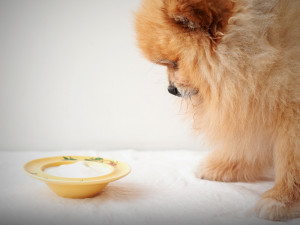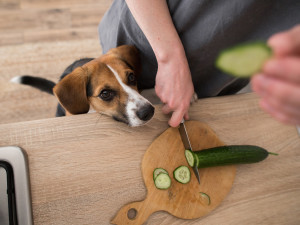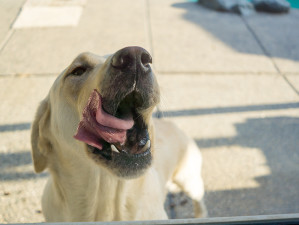Is Yoghurt Good For Your Dog?
It’s safe and healthy, and most dogs love it

share article
Yoghurt is a wonder food packed with probiotics, protein, calcium, vitamin B12 and other nutrients. Some yoghurts are healthier than others, but all forms of yoghurt are made by the bacterial fermentation of milk, and the best yoghurts contain live ‘cultures’ (friendly bacteria), which can help keep gut bacteria in balance. If you’re wondering if your pup can enjoy the health benefits of yoghurt, too, read on.
Can dogs have yoghurt?
In short, yes. Dogs can eat yoghurt – it’s safe and healthy, and most dogs love it. Yoghurt has many benefits for dogs, including aiding digestion, easing diarrhoea and boosting immunity, plus it’s often easier to digest for dogs than other dairy products because it contains less lactose.
Curious how to incorporate this superfoodopens in a new tab into your pup’s diet? Add a dollop of yoghurt to your pup’s dry food as a toppingopens in a new tab, give them a frozen yoghurt treat or use it to disguise their medication. Yoghurt can also be used to ease separation anxietyopens in a new tab or keep pups busy by using plain yoghurt (along with some peanut butter and dry food) as a Kong stufferopens in a new tab. Just remember that treats should make up no more than 10 percent of your dog’s daily calories, so keep an eye on the calorie counts with this high-calorie food.
Is yoghurt good for dogs?
Yoghurt is a good source of protein, calcium, phosphorus, vitamin B12 and riboflavin. The protein within yoghurt comes in two forms: whey and casein. Whey protein is considered a complete protein containing all nine essential amino acids and low lactose content. Yoghurt also has friendly live bacterial cultures (probiotics), which can provide digestive health benefits.
Yoghurt can be helpful for some dogs to resolve minor gastrointestinal (GI) problems. If your dog has a tummy ache, a bit of yoghurt could help them get back to normal. For minor stomach upsets, vets will often recommend fasting – feeding only white rice – for a short period of time to help restore your dog’s normal gastrointestinal flora.
The latest research shows a huge connection between gut bacteria and the health of the rest of the body. Studies show that keeping the GI microflora in balance can help with:
allergies
boosting immune system
behavioural problems
colon cancer
inflammation
obesity
But because yoghurt is a high-fat food, the benefits of active cultures may be limited for dogs (some vets recommend using supplements instead). In his book, The Dog Diet, Dr Greg Martinez says, “I used to recommend yoghurt for probiotic effects, but found that most yoghurt has low levels of bacteria and may be less effective than the probiotic power of capsules.”
Whilst yoghurt has plenty of nutritional benefits for your dog, there are also a few worries to watch out for. Lactose-intolerant dogs probably won’t handle yoghurt well, and some yoghurts have additives that are toxic to dogs. So how do you know what yoghurt is safe for your dog?
Types of yoghurt that dogs can have
The best yoghurt for your dog is simple, plain yoghurt. Serving your dog plain yoghurt ensures they aren’t exposed to unnecessary additives, sugars and dangerous sweeteners. But because not all yoghurts have the same ingredients, it’s best to check the label. For dogs, the best yoghurt:
is plain or unflavoured
is unsweetened
doesn’t contain additives
doesn’t contain xylitol (sometimes called birch sugar)
is low-fat
has active live cultures
What about Greek yoghurt for dogs?
Dogs can eat Greek yoghurt, too. Greek yoghurt is considered healthier than standard yoghurt because it contains more of those beneficial live cultures. While both Greek yoghurt and regular yoghurt are made from the same basic ingredient (milk), Greek yoghurt is thicker, creamier, contains less sugar and has more protein. Dogs with lactose intolerance who may not be able to enjoy regular yoghurt might try Greek yoghurt, which has lower levels of lactose.
Can dogs have flavoured yoghurts?
Two common household yoghurts – fruit-flavoured and vanilla – are also not recommended for dogs. Dogs shouldn’t eat fruit-flavoured yoghurts because they contain excess sugars (or toxic artificial sugar). Likewise, vanilla yoghurt also contains too much sugar for dogs. For a healthier option, pair fresh fruit, like blueberriesopens in a new tab or strawberriesopens in a new tab, with plain regular yoghurt or plain greek yoghurt.
Yoghurt treats for dogs
Treats made with quality ingredients can get quite expensive, especially if you do a lot of training. Making dog treats at home from time to time can help save on your budget and ensure that your pup is getting the right stuff. Here’s a wonderfully simple yoghurt dog treat recipe that dogs love, especially during the warm summer months.
Can dogs have other dairy products?
Many dogs can have dairy products such as cheese, milk, cottage cheese and ice cream in moderation – as a treat. Cheese is a very popular high-value dog training treat. Cutting up cheese into tiny bite-sized pieces makes for an excellent and rewarding reinforcement for dogs, but beware, cheese is also high in fat. It’s best to feed in moderation and use alternative treats for the bulk of your dog training (otherwise, your dog will likely suffer an upset stomach).
Some dogs with a sensitive stomach or lactose intolerance may experience stomach aches (and diarrhoea) after eating any amount of dairy products such as milk or cheese, which have higher lactose levels. As with any new food, introduce dairy products to your dog slowly and in small quantities. You might find your dog doesn’t like the smell or taste – not all dogs do – or they may be lactose intolerant. To be safe, contact your vet before making significant dietary changes or before introducing new foods.
Note: while caution was taken to give safe recommendations and accurate instructions in this article, it is impossible to predict an individual dog’s reaction to any food or ingredient. Readers should consult their vets and use personal judgement when applying this information to their own dogs’ diets.

Daniela Lopez
Daniela Lopez is a digital media specialist and long-time contributor to The Bark.
Related articles
![dog hiding under christmas dinner table eating scraps]() opens in a new tab
opens in a new tabWhich Christmas Foods Can My Dog Eat?
From turkey to mince pies, Brussels sprouts to parsnips, find out which festive foods it’s safe to sneak your pup from the table
- opens in a new tab
Can Dogs Eat Cucumbers?
That cucumber crunch is irresistible. Learn if your dog can get in on that action
![Various Veggie Chips in a Ceramic Blue Bowl]() opens in a new tab
opens in a new tabCan Dogs Eat Sweet Potatoes?
Add it to the list of healthy human superfoods pups can eat, too. Plus, a recipe for sweet potato crisps
- opens in a new tab
Can Dogs Eat Oranges?
Yes and no. Learn how to safely feed citrus to your pup
![Ridgeback puppy eating an apple from a low-hanging tree]() opens in a new tab
opens in a new tabCan Dogs Eat Apples?
Yep – this fibre-filled fruit is a healthy treat for your dog
![Labrador retriever licking their lips]() opens in a new tab
opens in a new tabWhy Do Dogs Eat Poo?
What to do when your dog has questionable tastes







